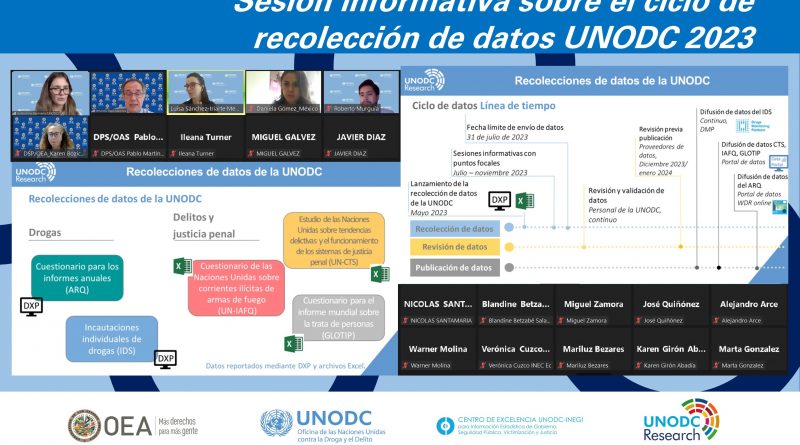The UNODC-INEGI Center of Excellence continues providing technical assistance in the region for the collection of data on drugs, crime and criminal justice.
On September 28th, the United Nations Office on Drugs and Crime (UNODC) in collaboration with the Center of Excellence UNODC-INEGI (CoE) held a briefing about the UNODC 2023 data collection cycle on drugs, crime, and criminal justice for the Spanish-speaking countries of the Americas and Europe.
The session was organized by the UNODC Research Trend and Analysis Branch (RAB) and the CoE, jointly with their regional partner, the Organization of American States (OAS).
The briefing aimed to provide information about the ongoing data collection cycle and to raise awareness among regional Focal Points on the importance and usefulness of this annual UNODC data collection to facilitating a greater response from countries.
During the event, the CoE presented the UNODC data collection process and the topics to be covered. Subsequently, two parallel sessions were held: one on crime & criminal justice statistics and other on drugs statistics.
During the session on crime and criminal justice statistics, led by the CoE, presentations were delivered on regional perspectives on crime and criminal justice statistics and progress in SDG monitoring. In addition, the three corresponding questionnaires were presented:
- United Nations Survey on Crime Trends and the Operations of Criminal Justice Systems (UN-CTS)
- United Nations Illicit Arms Flows Questionnaire (UN-IAFQ)
- Questionnaire for the Global Report on Trafficking in Persons (GLOTIP)
The session highlighted the fundamental role played by the CoE as regional technical support to headquarters in the data collection process of the firearms (UN-IAFQ) and human trafficking (GLOTIP) questionnaires in the 33 countries of Latin America and the Caribbean. On the other hand, the OAS serves as a regional partner for the UN-CTS data collection in the Americas.
In the session on drug statistics, the two questionnaires that collect data and information on this topic were presented:
- Annual Report Questionnaire (ARQ)
- Individual Drug Seizures (IDS)
This event brought together 151 people from 19 countries, who serve as focal points for UNODC.
UNODC data collection contributes to the harmonization of drug, crime and criminal justice statistics worldwide, providing global figures to guide the formulation of public policies. In addition, it facilitates the monitoring of the Sustainable Development Goals (SDG), particularly SDG 3, SDG 11, and SDG 16.
For more information, visit: https://www.unodc.org/unodc/en/data-and-analysis/data-collections.html or contact us by email unodc-mexico.cde.estadistica@un.org.



